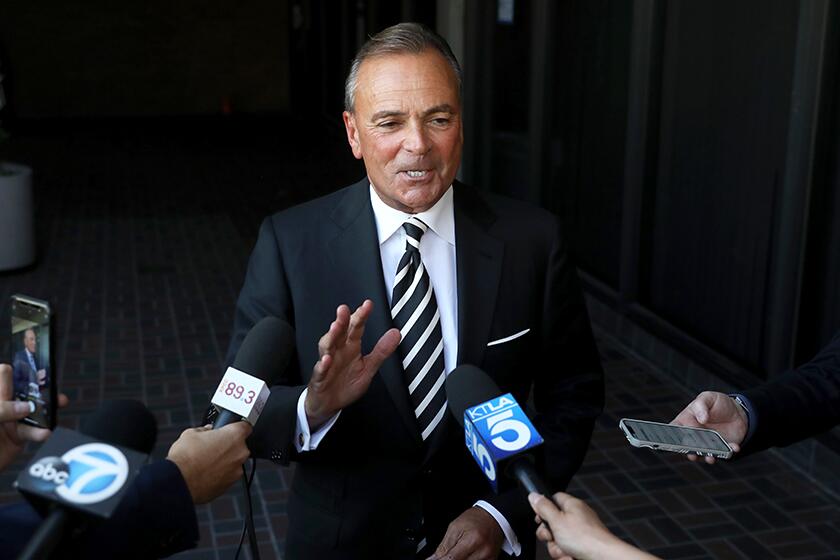Kevorkian License Hearing Friday : Medicine: Physician dubbed ‘Dr. Death’ is asking courts to restore his right to practice in California, which he lost in part for assisting in the suicide of a Costa Mesa man.
- Share via
Jack Kevorkian, dubbed “Dr. Death” for assisting in 21 suicides, including that of a Costa Mesa man, will seek reinstatement of his California medical license at a court hearing Friday, state officials said Monday.
The Medical Board of California voted to revoke Kevorkian’s license in July, citing among other cases that of cancer patient Jonathan Grenz, an Orange County real estate agent and one of two Californians who traveled to Kevorkian’s home state of Michigan to obtain help in committing suicide.
Deputy Atty. Gen. Thomas Lazar said Monday that the case involving Grenz helped form the cornerstone of the state’s evidence against Kevorkian, who obtained a California medical license in 1957 and worked at two hospitals in Long Beach from 1979 to 1982.
Grenz, 44, was found to have cancer in 1992, and doctors removed his voice box and tongue. But at the time he committed suicide with Kevorkian’s help, he had recovered from the cancer, according to testimony from a friend and co-worker, Linda Healy.
Kevorkian, 66, was later charged with murder in Michigan, where authorities cited his having assisted in the suicides of Grenz and Martha Ruwart, 40, of Cardiff by the Sea, whose duodenal cancer had invaded her small intestine and ovaries with numerous tumors.
Friday’s hearing will be in Los Angeles Superior Court. Kevorkian has also filed suit in U.S. District Court, alleging that California’s revocation of his medical license constitutes a violation of his civil rights. That matter will be heard in Los Angeles on Dec. 12.
Meanwhile, the Michigan Supreme Court is expected to rule soon on a variety of cases affecting Kevorkian, whose medical license has been suspended in his home state.
In May, the Michigan Court of Appeals overturned the state law designed to stop Kevorkian’s practice of assisted suicide but ordered murder charges reinstated against him. The Michigan Supreme Court then agreed to hear the case.
Joining Kevorkian as a co-plaintiff in the federal court case is an unidentified Los Angeles man who is dying of AIDS and who protests California’s ban on physician-assisted suicide, according to Kevorkian’s Los Angeles attorney, Mark Field, who noted that the man is not a client of Kevorkian’s.
“But this principle California follows applies to everybody,” Field said, “not just Jack Kevorkian. It prevents everyone in California from being able to control the timing and dignity of their death. It forces them to suffer and deprives them of any meaningful control over the end of their lives.”
As for Kevorkian’s California license, Field said, “obviously, we feel the state was wrong. Otherwise, we wouldn’t have challenged it in Superior Court. Aside from that, we feel a sense of puzzlement. Why did the California Medical Board feel it necessary to jump into a dispute that’s being handled entirely in Michigan, where each of the 21 suicides has taken place? Why is it California’s business?”
California and Michigan were the only states in which Kevorkian was licensed to practice medicine. Under California law, Kevorkian had the right to protest the suspension and later the revocation of his license through the administrative law process.
But at numerous hearings in San Diego, he failed to attend or send a representative, choosing instead to pursue the matter in state and federal courts.
Part of the state’s contention, according to Deputy Atty. Gen. Lazar, is that Kevorkian had the right to protest the suspension and revocation by “exhausting administrative remedies before the Medical Board.” His decision to reject those options is grounds for dismissal, Lazar said.
More to Read
Sign up for Essential California
The most important California stories and recommendations in your inbox every morning.
You may occasionally receive promotional content from the Los Angeles Times.









